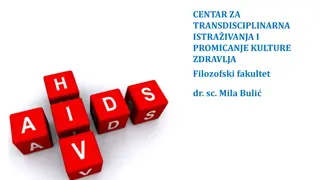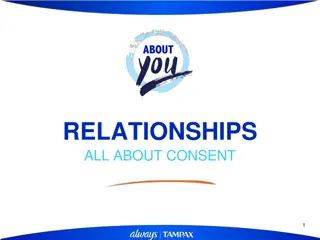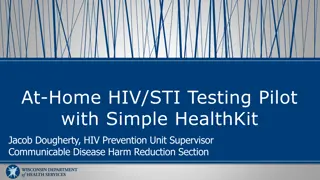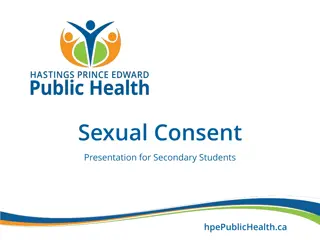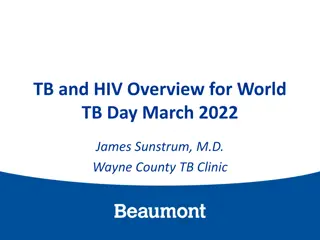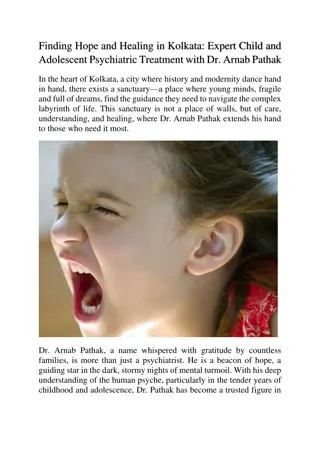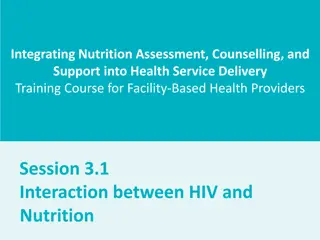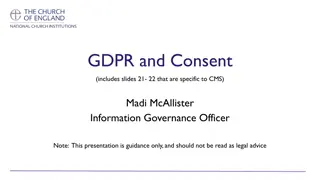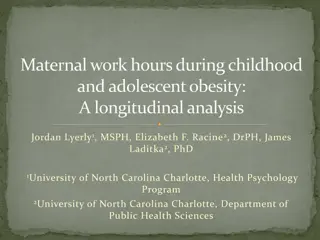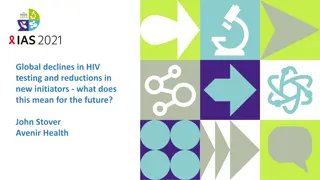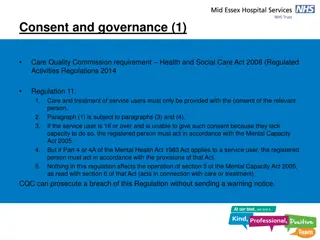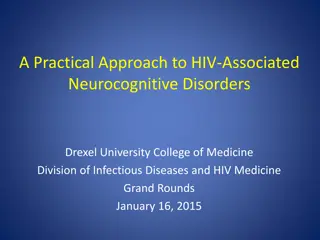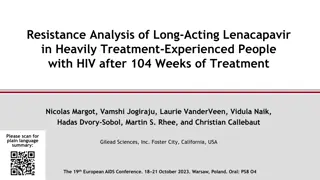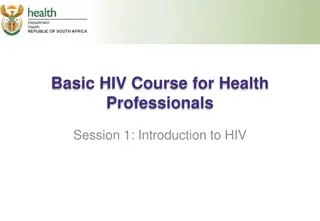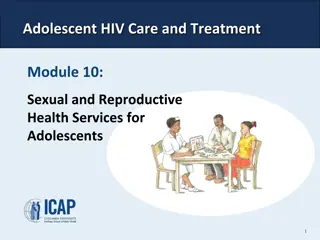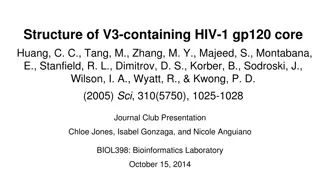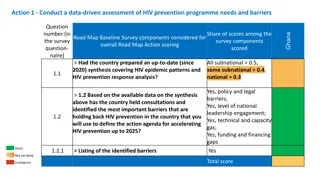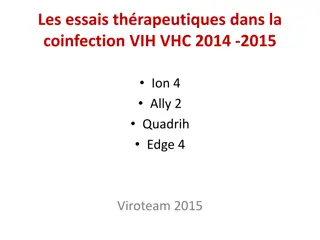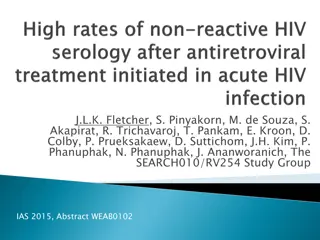Adolescent Consent to HIV and STI Treatment: New York State Guidelines
This guidance from the NYSDOH AIDS Institute outlines regulations allowing minors in New York State to consent for confidential HIV/STI screening, treatment, and prevention services. Clinicians are advised on identifying minors who may benefit from PrEP/PEP, ensuring confidentiality, and providing antiretroviral therapy for achieving Undetectable = Untransmittable (U=U) status.
Download Presentation

Please find below an Image/Link to download the presentation.
The content on the website is provided AS IS for your information and personal use only. It may not be sold, licensed, or shared on other websites without obtaining consent from the author.If you encounter any issues during the download, it is possible that the publisher has removed the file from their server.
You are allowed to download the files provided on this website for personal or commercial use, subject to the condition that they are used lawfully. All files are the property of their respective owners.
The content on the website is provided AS IS for your information and personal use only. It may not be sold, licensed, or shared on other websites without obtaining consent from the author.
E N D
Presentation Transcript
Guidance: Adolescent Consent to HIV and STI Treatment and Prevention www.hivguidelines.org MAY 2024 NYSDOH AIDS Institute Clinical Guidelines Program
Purpose of This Guidance Purpose of This Guidance Inform New York State clinicians who provide primary care to adolescents about existing regulations that allow minors (<18 years old) to consent for and receive confidential HIV and STI screening and treatment and biomedical HIV prevention in the form of pre- or post- exposure prophylaxis (PrEP or PEP) MAY 2024 NYSDOH AIDS Institute Clinical Guidelines Program www.hivguidelines.org
Goals for Clinicians Treating Minors Goals for Clinicians Treating Minors Identifying minors who may benefit from PrEP and PEP Providing education and counseling about PrEP and PEP use, so that they may be accessed when needed Ensuring confidentiality and preventing accidental disclosure of HIV status Ensuring retention in care with provision of combination antiretroviral therapy to promote achievement of Undetectable = Untransmittable (U=U) MAY 2024 NYSDOH AIDS Institute Clinical Guidelines Program www.hivguidelines.org
New York State Law: Consent New York State Law: Consent According to New York State Public Health Law Article 23, Title 1, Section 2305, individuals <18 years old may give effective informed consent for services related to screening, treatment, and prevention of STIs, including HIV. Minor consent laws vary by state, and clinicians should be familiar with state laws. MAY 2024 NYSDOH AIDS Institute Clinical Guidelines Program www.hivguidelines.org
New York State Law: Immunization Reporting New York State Law: Immunization Reporting The New York State Immunization Registry Law requires healthcare providers to report the immunization history for and all immunizations administered to patients <19 years old using the New York State Immunization Information System or, in New York City, the Citywide Immunization Registry. There are no exemptions to the reporting mandate, so vaccination against HPV is required as well. Minors who independently consent to vaccination against HPV should be advised of these reporting requirements and further advised that any immunization-specific information reported to the New York State or New York City systems may be requested by a parent or guardian. MAY 2024 NYSDOH AIDS Institute Clinical Guidelines Program www.hivguidelines.org
Federal Law: 21 Federal Law: 21st st Century Cares Act Century Cares Act Federal law 45 CFR 164.524 requires that healthcare providers give patients access without charge to all of the health information in their electronic medical records. Healthcare providers should become familiar with their institutional policies regarding health information sharing for minors, should advocate for policies that incorporate adolescent confidentiality protections, and should be able to provide guidance to minors on how to access and protect their health information. MAY 2024 NYSDOH AIDS Institute Clinical Guidelines Program www.hivguidelines.org
Good Practices Good Practices Stay up to date on New York State law regarding consent and confidentiality for adolescents. Ensure that adolescents <18 years old receive confidential care for HIV treatment and prevention. Educate adolescents who have or are at risk of HIV about the law and their rights. Inform adolescent patients about New York State reporting requirements. Ensure that institutional policies reflect New York State law regarding adolescents <18 years old who seek care for HIV treatment or prevention and who choose not to disclose this to their parents or legal guardians. Encourage adolescents who consent to their own care to identify an adult who can provide support. Make every effort to prevent disclosure of confidential information through release of medical records, pharmacy records, or explanation of benefits by creating clear policies and providing resources to help adolescent minors navigate the complexities of the healthcare system. MAY 2024 NYSDOH AIDS Institute Clinical Guidelines Program www.hivguidelines.org
Key Points: Disclosure and Consent Key Points: Disclosure and Consent Adolescents may be at risk of abuse if they disclose that they have HIV or are at risk of acquiring HIV. Appropriate referrals and assistance should be offered to patients reporting such risk. Discussions about disclosure and possible risks to the adolescent can be documented in the medical record. Supportive adults may be an important resource to help adolescent patients remain engaged in care. Clinicians can help patients identify supportive adults and facilitate conversations around disclosure if requested. Coordination with insurance companies is necessary to ensure that confidentiality is managed according to the wishes of an adolescent patient. MAY 2024 NYSDOH AIDS Institute Clinical Guidelines Program www.hivguidelines.org
Consent and Confidentiality Consent and Confidentiality Education about and assistance with an insurance plan s member services regarding the following rights is essential so adolescents are able to: Opt out of explanations of benefits or other communications (e.g., prior authorization notices) that are mailed to their parents or legal guardians regarding HIV care Request that insurance cards be mailed to the address of their choice (e.g., an alternate to family address) Ensure that information is not inadvertently disclosed through electronic portals that parents or legal guardians are able to access MAY 2024 NYSDOH AIDS Institute Clinical Guidelines Program www.hivguidelines.org
Retention in Care Retention in Care Adolescents with HIV should be encouraged to remain in care and keep scheduled appointments. Adolescents may consent to and are eligible for all of the following essential medical services: Prescription and management of antiretroviral therapy Standard disease monitoring (e.g., physical and laboratory assessments such as CD4 counts and viral load tests) Screening and treatment for STIs Recommended immunizations, including for HPV Sexual health and family planning services. In New York State, minors can consent to all forms of contraception, including condoms, emergency contraception, and long-acting methods, such as implants. Minors may also consent to abortion services without parental involvement. Counseling and treatment for risk reduction, mental health, and substance use, as permitted by law MAY 2024 NYSDOH AIDS Institute Clinical Guidelines Program www.hivguidelines.org
Need Help? Need Help? NYSDOH AIDS Institute Clinical Guidelines Program www.hivguidelines.org
Access the Guidance Access the Guidance www.hivguidelines.org > Guidance: Adolescent Consent to HIV and STI Treatment and Prevention Also available: Printable pocket guide and PDF NYSDOH AIDS Institute Clinical Guidelines Program www.hivguidelines.org



